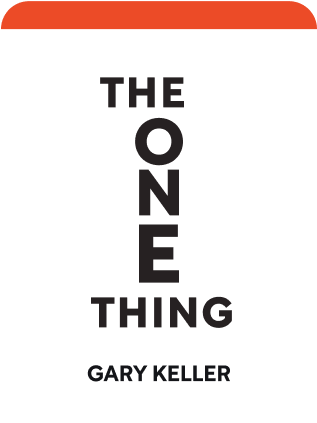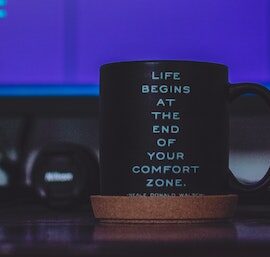

This article is an excerpt from the Shortform book guide to "The One Thing" by Gary Keller. Shortform has the world's best summaries and analyses of books you should be reading.
Like this article? Sign up for a free trial here .
If you were to focus on one thing at a time, what could you achieve? What difference could it make for your success?
When it comes to achieving your goals, a daily focus on One Thing will make the biggest impact. Start by thinking big, and then focus small to identify the One Thing you can do right now—and then the next One Thing you can do toward reaching your goal.
Read more to learn how a focus on One Thing at a time is the key to extraordinary success.
The One Thing
In The One Thing, real estate entrepreneur Gary Keller argues that the key to extraordinary success is focusing daily on the “One Thing” that will make the biggest difference in achieving your goal.
Keller, founder of the world’s largest real estate company Keller Williams, says that success comes from choosing and doing the right things sequentially, each connected to and building on the previous one, rather than doing a lot of disparate things, regardless of value, simultaneously. Extraordinary focus on One Thing each day is what leads to extraordinary success.
You start by thinking big—imagining extraordinary results—then narrowing your focus until you’re thinking small—that is, focusing on the most important thing you can do at the moment to help get you where you ultimately want to go. Focus on One Thing exclusively, and when you complete it, move on to the next One Thing on your way to your goal.
The Domino Effect
When you prioritize so you’re focusing on the right thing at the moment, everything after that subsequently falls into place like a progression of dominoes.
Physicist Lorne Whitehead determined in 1983 that a single domino can bring down another domino that’s 50% bigger. Another physicist tested and confirmed this in 2001, using eight dominoes of plywood, each 50% larger than the one before. The first was two inches tall and the last one thirty-six inches tall.
When you pursue your goals by starting with the one, right thing, it leads to bigger things—you build energy in a geometric progression like Whitehead’s progressively larger dominoes. To keep doing the math:
- The tenth domino would be nearly as tall as NFL QB Payton Manning.
- The eighteenth would be comparable to the Leaning Tower of Pisa.
- The twenty-third would be taller than the Eiffel Tower.
- The thirty-first would surpass Mount Everest by 3,000 feet.
- The fifty-seventh would be comparable in height to the distance between earth and moon.
To achieve success, aim for the moon. Getting there is doable when you create a domino effect in your life with a focus on One Thing at a time.
Success Is Sequential
Exceptional success, like a domino fall, is sequential, not something you achieve by multitasking or doing a lot of things simultaneously. You line up your priorities and focus on the first domino until you topple it. You begin with a linear process that becomes geometric; you build momentum as you do the first right thing, followed by the next and the next.
A wealthy person doesn’t become wealthy in a day; a champion athlete doesn’t start winning on day one. Money, skills, expertise, and accomplishments are built over time. Success builds on success, sequentially, as you move from a focus on One Thing to another until you reach the highest level possible.
Focus on One Thing to Live Large
When you dream big and then make that dream your goal, you’ll end up living large. To see what this could look like, write down your income and multiply it by two, five, ten, or some other number. Then write down the new number.
Ask yourself whether what you’re doing now will get you this number in the next five years. If your current actions will get you there, continue doubling the number until they won’t.
If you change your actions to match the ultimate number—your big goal—you’ll be living large.
You can apply this process to anything that matters: your health, relationships, spiritual life, career, finances, or business success. When you stop limiting your thinking, you remove the limits on where you can go in your life.
Of course, getting there requires working backward from your goal to determine the specific steps you need to take. Then, build momentum toward your goal with a focus on One Thing at a time until you master it. By taking action now, you avoid the alternative, which is feeling regret later.
In Top Five Regrets of the Dying, Bronnie Ware interviewed people at the end of their lives about what they wished they’d done differently. The most common responses were wishing they’d:
- Embraced happiness (realizing happiness is a choice)
- Kept in touch with friends
- Had the courage to express feelings
- Not worked so hard
- Lived their dreams, not others’ expectations.
Other researchers have also found that what people regret most at the end of life are the things they didn’t do. The way to avoid this is to make sure that each day you do what matters most, so that everything else falls into place. You are the engineer of your success, and you are the first domino.

———End of Preview———
Like what you just read? Read the rest of the world's best book summary and analysis of Gary Keller's "The One Thing" at Shortform .
Here's what you'll find in our full The One Thing summary :
- Why focusing daily on one thing, rather than many, is the key to success
- How success is like dominos
- The six common myths about success






